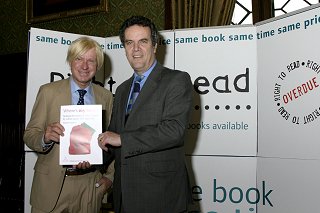RIGHT TO READ FOR LOCAL CHILDREN WHO ARE BLIND, PARTIALLY SIGHTED AND HAVE DYSLEXIA
 Over one hundred blind, partially sighted and dyslexic children
Over one hundred blind, partially sighted and dyslexic children
travelled from across the UK to Westminster on Wednesday 28th March to
meet Michael Fabricant and other MPs to support their Right to Read.
Blind, partially sighted and dyslexic children are missing out at home
and at school because they often can’t get hold of books in a format
they can read such as large print, audio, braille and electronically.
Michael Fabricant says "Reading is the key to children learning. I was
shocked to hear that children who are blind, partially sighted or have
dyslexia are missing out on their education because they can’t read
their textbooks or leisure books. 2008 has been designated as the
National Year of Reading and I will be raising the issue with Government
and asking them how they will ensure that children in Lichfield,
Burntwood and the rest of my constituency who are blind, partially
sighted or who have dyslexia will be able to get hold of more books they
can read during 2008. One of the easiest and most cost effective ways
of doing this would be for publishers to make their books available in
electronic form. The script size can then be enlarged at will and, in
the case of those children with no sight, computers can now read the
text out loud. Electronic text can also be converted to braille."
John Palmer, Chairman of the Right to Read Alliance, said: "It’s nothing
short of a scandal that these children are being denied something as
basic as the right to read. Recent research reveals that only 12 per
cent of maths and eight per cent of science GCSE textbooks are available
in large print or braille. The Right to Read Alliance is calling on
Government to act urgently and set up a nationally co-ordinated system
for providing schoolbooks for children unable to read the small text in
their school books."
Teachers are reduced to spending hours photocopying, enlarging and
retyping pages from textbooks to turn into braille or large print, so
that their pupils don’t go without. Yet despite teachers’ best efforts
many blind and partially sighted children and those with dyslexia still
get their books later than their classmates. Nine out of ten teachers
surveyed by RNIB said this affected blind and partially sighted pupils
both educationally and socially, often leaving them struggling to catch
up with sighted classmates and feeling less independent.
Children’s Laureate Jacqueline Wilson is a fervent supporter of the
campaign and is speaking at the lobby. She said: "Reading means the
world to me and that’s why I came along to talk to my MP – it’s vital
that the Government does its bit to make more books available to
children with sight problems and dyslexia. I want us authors to all work
together with the common aim of getting our books out to absolutely
everyone who wants to read them."
Photograph shows Michael fabricant with Steve Winyard of the Royal
National Institute for the Blind in the House of Commons.